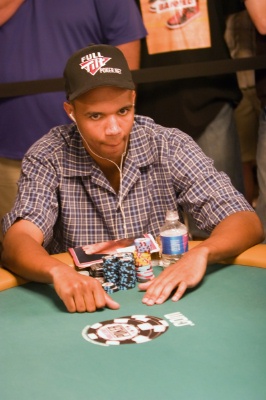|
|

Read –
1. To surmise where you stand in a poker hand based upon the information available to you.
2. To evaluate the cards on the board, or hand strength at showdown.
Good poker players have many different tools they use to maximize their wins and minimize their losses. In order to maximize profit,
you have to be able to accurately assess where you stand in the hand without being able to see all, or in some cases any, of your
opponents’ cards. Luckily, there are many clues and bits of information
that will help you to make this evaluation relatively accurately much of the time. When you use the information available to you to
draw a conclusion about where you stand in a poker hand, you have gotten a
“read” on the situation.
In addition to getting a read on a situation, you can also get a read on a particular player. Players’ individual styles of play
frequently fall into definable categories. For example, a player may be loose aggressive (LAG), or a calling station, or a
maniac, and
so on. You can sometimes determine in a very short period of time, based upon your opponents’ play, which category they fall into.
When you have done this, you have gotten a read on that player. Since your opponent has shown a pattern that is consistent with a
particular style of play, you can make assumptions about how he is likely to handle many different poker situations, based upon your
knowledge of his playing style. If your read is accurate, you will have a big advantage when you engage this individual.
In addition to getting a generalized read on a player, you can also get a read on a specific action your opponent makes. Any action
your opponent makes is subject to interpretation of his body language and other tells. Most frequently, you will be concerned with
getting a read on your opponent when he calls, bets, or raises. Sometimes, when he is in the process of putting chips into the pot,
your opponent will give himself away. One mistake that many players make is over acting, sometimes referred to as “Hollywooding.” In
an effort to deceive their opponents about the true strength of their hand, many players will try to act weak when they are strong and
strong when they are weak. This display will often include some really terrible acting including exaggerated sighs, intentionally
misleading comments, and the like. This is the type of information that you can base a read on. Your opponent does not realize it, but
when he over acts, he is giving away the very information that he is trying to
protect.
Getting a good read is especially critical in no-limit play, and in tournament play, where one decision can make or break you. Your
focus should be on collecting quality information. Before you can make a read, you have to collect the information you base your read
on. This information is collected largely through observation. To make the best read possible, you have to do a good job collecting
and evaluating information about your opponent. This means paying close attention to the game, and actively seeking helpful bits of information.
In a slightly different context, you also “read” you own hand. This simply means that you look at your hand and make sense of it. You
can also read the board, and the dealer will read all valid hands turned up at
showdown, and afterwards, will award the pot to the winner.
It is a fairly common mistake for a player to misread either their hand or the board. This usually means that either one of two
things. It can mean they thought that they had completed a hand that in actuality they had not, or it can mean that they missed that
they held a hand of value. This is a bad mistake to make, because when you make it, you base your actions on a hand that you do not
have. This often means you make the wrong play, and sometimes repeatedly. Misreading your hand or the board can cost you numerous bets
and can sometimes cost you the whole pot. You can avoid misreading your hand by paying better attention to the game, and by evaluating
your situation thoroughly before you act. New players are much more prone to misreading their hands than more experienced players. If
you are a new player, you should always double check your hand before you act. As you gain experience, reading your hand becomes like
second nature, and misreading your hand becomes a rare occurrence.
Usage: Got A Good Read, Read You For A Flush, Misread The Situation
Previous Poker Term: Rank
Next Poker Term: Rebuy |
|









